On-Demand CE Training
As a helping professional, you're required to take a certain amount of CE trainings each licensure cycle, but they tend to be costly, non-engaging, and lackluster. On-demand/self-paced courses are extremely convenient, but who wants to read copious volumes of boring text? Are you ready for a change and to experience the new world of CE trainings?
By incorporating mixed media, videos, and other innovative learning strategies, CEU Creations makes these required trainings affordable, engaging, and informative. Enjoy the convenience of our virtual, on-demand trainings from the comfort of your own home.
**On-Demand courses are pre-recorded. You will not have the chat or Q&A options the presenter may mention. This will not affect your certificate.
#NoMoreBoringCEUs
See our on-demand CE training listings below. To bundle and save click here.

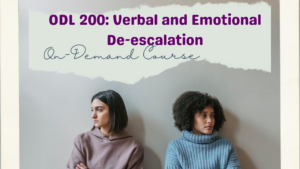
ODL 200: Verbal and Emotional De-escalation
1 Credit hour: Helping professionals serve on the front lines in every practice setting, dedicating themselves to assisting others in the most challenging and uncertain circumstances. It is essential that clinicians acquire the skills and techniques necessary to de-escalate tense situations. This one-hour course will be jam-packed with an overview of de-escalation Techniques.
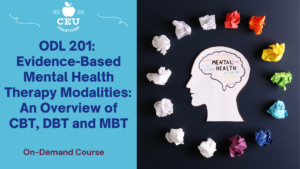
ODL 201: Evidence-Based Mental Health Therapy Modalities: An Overview of CBT, DBT and MBT
5 Credit Hours: Clinicians require a vast array of therapeutic tools, approaches, and skills to provide evidence-based treatment to the patients and clients. Join expert clinicians for this introduction to Cognitive Behavioral Therapy (CBT), Dialectical Behavior Therapy (DBT), and Mentalization Based Therapy (MBT). Attendees will gain evidence-based practice information and skills to incorporate into their everyday practice.
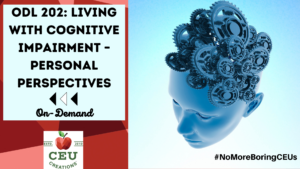
ODL 202: Living with Cognitive Impairment – Personal Perspectives
1 Credit Hour: More than 16 million people in the United States are living with cognitive impairment. With age being the greatest risk factor, this number is expected to dramatically increase as the Baby Boomer generation passes the age of 65. In this one-hour discussion, we hear from two people living with cognitive impairment who are finding purposeful and joyful living.
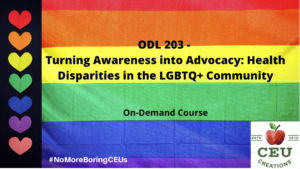
ODL 203: Turning Awareness into Advocacy: Health Disparities in the LGBTQ+ Community
2 Credit Hours: Helping professionals and healthcare providers are trusted with the important role of caring for people during what can be vulnerable moments, and it is imperative that they practice with competence and humility. In this honest conversation, M. Greg Green, Author and Advocate, will provide an overview of the LGBTQ+ community, their diverse health needs, and the bias that they can experience in the systems in which we practice.
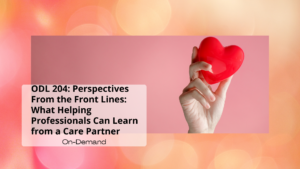
ODL 204: Perspectives From the Front Lines: What Helping Professionals Can Learn from a Care Partner
2 Credit Hours: How often do you look through the lens of the care partner or caregiver of your clients? This thought-provoking course covers all topics of being a care partner to someone with dementia or Alzheimer’s. This training is packed with many practical tips that can help with the day-to-day care of a loved one.
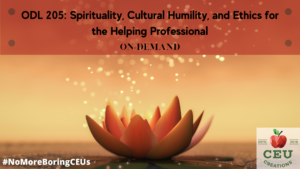
ODL 205: Spirituality, Cultural Humility, and Ethics for the Helping Professional
5 Credit Hours: This training will discuss utilizing spirituality and cultural humility in the clinical setting. The training will provide a rationale for integrating a spiritual approach as we provide support for our clients and patients, along with the ethical role of the helping professional in working with diverse populations. The second half of the presentation will focus on cultural humility. Embarking on a journey of critical self-reflection, discovery, and humility.
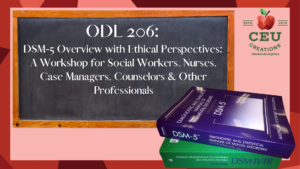
ODL 206: DSM-5 Overview with Ethical Perspectives: A Workshop for Social Workers, Nurses, Case Managers, Counselors & Other Professionals
5 Credit Hours: This course provides a DSM-5 “tune-up” – where we go back to the basics and review some of the major content areas and psychiatric disorders. This course focuses on some of the major content areas of the DSM-5 - going over disorders, criteria and breaking them down for a better understanding. In addition, the course reviews ethical frameworks for social workers, case managers, nurses and counselors.
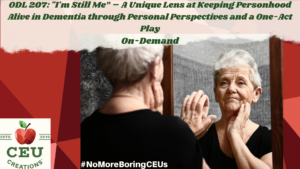
ODL 207: “I’m Still Me” – A Unique Lens at Keeping Personhood Alive in Dementia through Personal Perspectives
1 Credit Hour: More than 16 million people in the United States are living with cognitive impairment. As helping professionals, we often see the clients who are the human beings behind these statistics and wish to continue to live their life with meaning, dignity, and purpose. This eye-opening discussion will include the personal perspectives of a social worker and others living with some form of cognitive impairment.
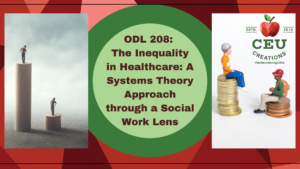
ODL 208: The Inequality in Healthcare: A Systems Theory Approach through a Social Work Lens
1 Credit Hour: Inequalities in healthcare is an issue that affects every single person. This course will provide a brief overview of those inequalities in the healthcare system. Understanding the whole system will provide insights that will help healthcare professionals and social workers recognize and combat the inequalities that create barriers to quality care.
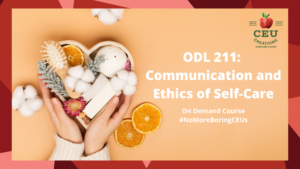
ODL 211: Communication and Ethics of Self-Care
2 Credit Hours: Most individuals decide to enter the helping professions because of a deep commitment to help others. As we communicate with our clients/patients on the importance of self-care as a prerequisite for wellbeing, many of us are experiencing compassion fatigue or burnout. In this invigorating presentation, Jenny Buckley, RN, BSN, CHPN, will discuss the necessity for self-care as an ethical imperative, strategies for practicing self-care, and communication best-practices to promote self-care in your professional practice.
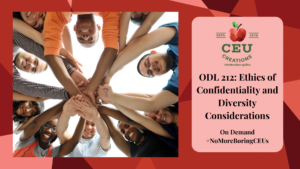
ODL 212: Ethics of Confidentiality and Diversity Considerations
5 Credit Hours: School social workers and other professionals working in the school setting have many factors to consider in their work with students and families. Understanding ethics regarding confidentiality of minors in school settings is important for best practices and ethical decision making. Diversity considerations in school settings will also be explored. Implicit bias, cultural competence, and specific dynamics of culture in schools will be presented.
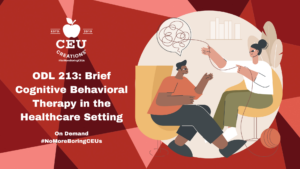
ODL 213: Brief Cognitive Behavioral Therapy in the Healthcare Setting
1 Credit Hour: The fast-paced nature of healthcare settings requires clinicians to have brief and effective methods of intervening with client problems. Brief Cognitive Behavioral Therapy provides clinicians with a framework and tools for successful outcomes. This training will present an overview of the CBT model, along with discussing the brief form of this model. Specific interventions for healthcare settings will be explored, including the “10 Minute CBT” framework and helpful clinical tools.
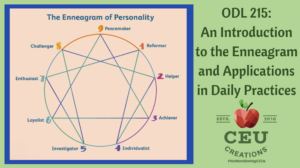
ODL 215: An Introduction to the Enneagram and Applications in Daily Practices
5 Credit Hours: The Enneagram is a personality system that helps us understand ourselves and one another, like the Myers-Briggs. This personality system is unique because it not only helps us understand our persona but also invites us to grow emotionally and spiritually. The Enneagram includes nine personalities and each of these personalities has considerable strengths and weaknesses. Using self-awareness and other interactive exercises, didactic learning, and insights of applying the Enneagram in day-to-day clinical practice, this introductory course will provide an excellent overview of this tool.
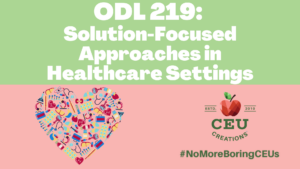
ODL 219: Solution Focused Approaches in Healthcare Settings
1 Credit Hour: The fast-paced nature of healthcare settings challenges clinicians to utilize appropriate intervention models within a specific time frame in which patients may only receive services for a brief amount of time. Solution-focused therapy offers promising approaches to addressing patient needs in a strengths-based, focused interviewing style. Clinical tools such as EARS and ROPES will be presented, along with relevant case vignettes for critical thinking.
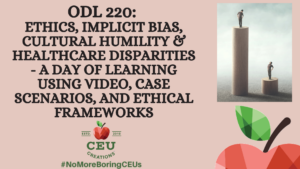
ODL 220: Ethics, Implicit Bias, Cultural Humility and Healthcare Disparities – A Day of Learning Using Video, Case Scenarios, and Ethical Frameworks
5 Credit Hours: Implicit bias is an “implicit stereotype, an unconscious attribution of particular qualities to a member of a certain social group.” As helping professionals, we have an ethical obligation to explore evidence-based research around the causes of the disparities in minority communities and work on actively closing these gaps in care. This course will address the definition of implicit bias, including appropriate strategies for practice.
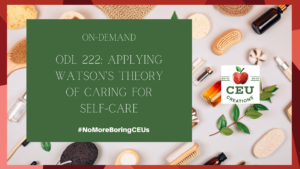
ODL 222: Applying Watson’s Theory of Caring for Self-Care
2 Credit Hours: As those of us who work in the helping profession realize, vicarious trauma/burnout and compassion fatigue are very real and debilitating syndromes – that can leave us feeling drained, depressed and physically sick with a multitude of other issues. Therefore, it is critical that we take care of ourselves in order to care for our clients, patients and families. Thus, this presentation will not only introduce Watson’s theory and Caritas Processes, but will focus on how each learner can incorporate the theory into professional practice and personal habits for self-care.
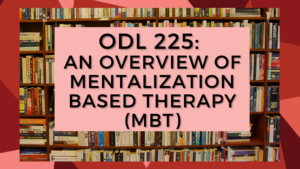
ODL 225: An Overview of Mentalization Based Therapy (MBT)
1 Credit Hour: Clinicians require a vast array of therapeutic tools, approaches, and skills to provide evidence-based treatment to the patients and clients. In this jam packed one hour training we take a deeper dive into Mentalization Based Therapy (MBT). Griffin Smith, LCSW, will provide the history and origin of MBT, a better understanding of the core concepts of MBT, and how mentalizing can be useful in your professional practice and personal life.
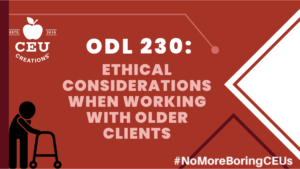
ODL 230: Ethical Considerations when Working with Older Clients
2 Credit Hours: Helping professionals (social workers, counselors, nurses, and case managers) that practice in spaces with older adults can experience scenarios that create ethical dilemmas. For example, identifying the ‘right’ path of intervention when working with a client that is neglectful of their own needs, while considering that same client’s right to self-determination.
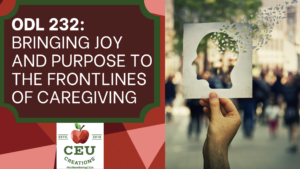
ODL 232: Bringing Joy and Purpose to the Frontlines of Caregiving
1 Credit Hour: This thought-provoking course will cover all topics of being a care partner to someone with dementia or Alzheimer’s. Lisa Marshall, author of the NEW book Oh Hello Alzheimer’s: A Caregiver’s Journey of Love, will share her experiences through an interview-style format. Lisa shares her story, including diagnosis, early denial, progression of the disease, how Lisa and her husband coped, and most of all how they continued to bring joy and purpose to their lives.

ODL 233: An Introduction to the Enneagram and Applications in Daily Practices
1 Credit Hour: The Enneagram is a personality system that helps us understand ourselves and one another, like the Myers-Briggs. The Enneagram includes nine personalities and each of these personalities has considerable strengths and weaknesses. Each personality also has one particular Achilles heel, and once we become aware of this, we are more able to move toward transformation and life. We will be reviewing these nine Enneagram types.
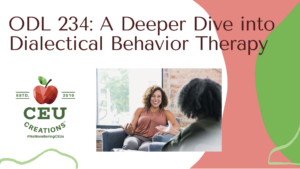
ODL 234: A Deeper Dive into Dialectical Behavior Therapy
6 Credit Hours: Dialectical Behavioral Therapy, or DBT, is not just useful with people who have Borderline Personality Disorder (BPD). "DBT-informed Treatment" is shown to be quite effective with individuals who do not have BPD. This workshop will introduce learners to the validity of DBT interventions for individuals who struggle with anxiety, depression, trauma, impulse control, and relationships.
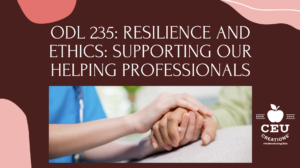
ODL 235: Resilience and Ethics: Supporting Our Helping Professionals
1 Credit Hour: Since the pandemic, helping professionals have experienced record levels of burnout, stress and compassion fatigue. While many trainings focus on self-care, this training focuses on exploring the concept of resilience. Participants will walk through creating their own plan to build resilience and will finish with free tools to use both professionally and personally.
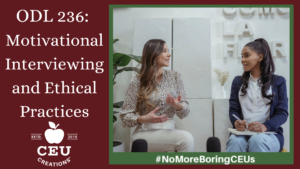
ODL 236: Motivational Interviewing and Ethical Practices
5 Credit Hours: Motivational Interviewing is an effective ethical technique for professionals in many practice settings to engage in meaningful conversations with clients to help facilitate attitude and behavior change. This workshop examines a brief definition and history, theoretical framework, style and spirit, process, and techniques of motivational interviewing. The workshop also explores how biases and diversity influence behavior and services, and provides tools for reflection, self-monitoring and regulation to manage personal values and maintain professional standards of practice.
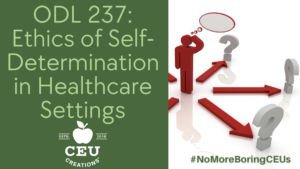
ODL 237: Ethics of Self-Determination in Healthcare Settings
1 Credit Hour: Healthcare settings present service providers with diverse patient situations and circumstances which sometimes involve ethical dilemmas. Specific ethical dilemmas in medical settings will be introduced for learners to critically analyze through case studies, including decisional capacity, competence, cultural factors, and autonomy.
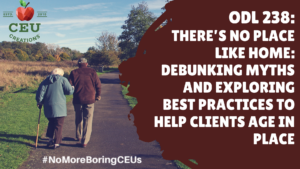
ODL 238: There’s No Place Like Home: Debunking Myths and Exploring Best Practices to Help Clients Age in Place
1 Credit Hour: All of the nation's 74 million baby boomers will be 65 and older by the year 2030. Combining this rapidly growing population with the COVID-19 pandemic, many people are choosing to stay in their own homes or plan to stay in their homes as they reach their golden years. Triff Cook, MBA, CMC, Director of Client Services, Aging Life Care Expert, and Active Member of ALCA National Organization since 2009, will walk participants through best practices of helping our clients plan for aging in their own home.
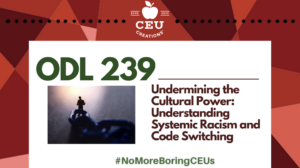
ODL 239: Undermining the Cultural Power: Understanding Systemic Racism and Code Switching
5 Credit Hours: Helping professionals are on the frontlines of many disparities that people face on a daily basis, and systemic racism is one of them. While we as the helping professionals are trying to decrease the number of barriers our clients or patients face, we are up against an enormous barrier for our clients or patients who identify as BIPOC. This full day event will provide a discussion of how we as a society arrived at this place of oppression and what we can do to help.
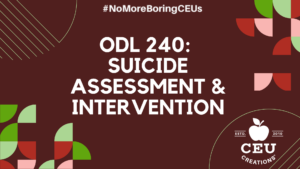
ODL 240: Suicide Assessment and Intervention
5 Credit Hours: One of a clinician's biggest responsibilities is assessing and intervening with suicidal clients. In this training, comprehensive suicide assessment tools and approaches will be discussed. Learn about best practices for completing a thorough suicide assessment. Discover evidenced-based intervention methods to address suicidality and reduce risk. Classify legal and ethical requirements for effective practice. Leave this workshop with newfound confidence and skills to support suicidal clients.
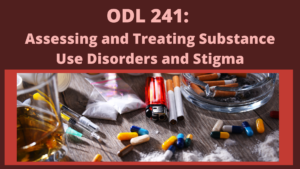
ODL 241: Assessing and Treating Substance Use Disorders and Stigma
5 Credit Hours: Substance use is a growing problem in the United States and around the world. Substance use disorders and other addictive behaviors are often exhibited with co-occurring health and mental health disorders and may include polysubstance use patterns. Often, clients who need help because of substance use disorders do not recognize the problem and are reluctant to seek treatment services. As helping professionals, it is imperative to know how to identify and assess clients and their families for substance use disorder and ensure they receive the appropriate level of evidence-based therapeutic intervention. Presented by Rhonda DiNovo, LMSW, Clinical Assistant Professor, University of South Carolina, College of Social Work, this workshop will examine the ethical standards and evidence-based practices involved in assessing and treating individuals and families with substance use disorders and the addictive and co-occurring disorders that so often accompany them.
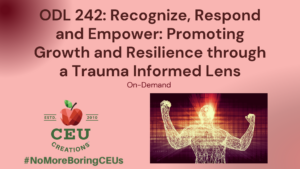
ODL 242: Recognize, Respond and Empower: Promoting Growth and Resilience through a Trauma Informed Lens
5 Credit Hours: Trauma Informed Care has been all the buzz with organizations being trauma informed and practitioners utilizing a trauma informed approach, but have you wondered what this actually looks like? Do you want to know how you can be trauma informed or how to assess your own trauma informed approach? If you answered “yes”, then this event is for you! In the morning, participants will hear the story of a survivor and the factors that led to her success. Throughout the rest of the day participants will learn how to implement a framework in which they recognize, respond, and empower the populations they work with.
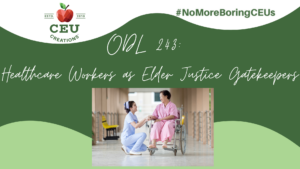
ODL 243: Healthcare Workers as Elder Justice Gatekeepers
2 Credit Hours: Elder abuse is a complex and dramatically underreported issue correlated with increased usage of healthcare systems, including emergency rooms, sub-acute rehabilitation programs and long-term care facilities. This presentation will discuss forensic biomarkers that can indicate elder abuse and provide assessment and intervention strategies for healthcare workers.
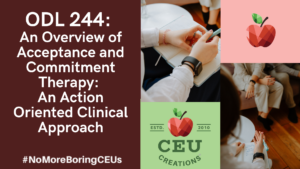
ODL 244: An Overview of Acceptance and Commitment Therapy: An Action Oriented Clinical Approach
5 Credit Hours: As a clinician it is important to have knowledge of various therapeutic models and useful interventions to help clients. Acceptance and Commitment Therapy, or ACT, is emerging as a very promising and evidenced-based therapeutic modality to treat a host of mental health conditions. ACT is evidenced based for depression, anxiety, suicide, trauma, and many more mental health conditions. Learners will find ACT approaches and interventions relevant to a variety of clients in diverse settings through examining case studies, video clips, and worksheets.
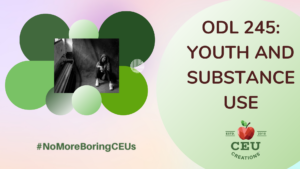
ODL 245: Youth and Substance Use
5 Credit Hours: Adolescents go through many important biological and developmental changes. Their brains are growing rapidly, and they are constructing imperative cognitive and emotional processes. They inherently seek novelty and risk, which can often lead to experimentation with substance use and the development of addictive behaviors. This course will examine the connection between adolescent development and substance use; substance use trends and prevalence among adolescent populations; various risk, protective, and system factors that impact adolescent substance use and current treatment services.
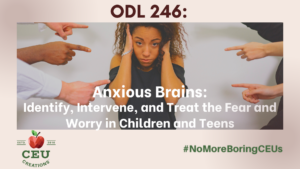
ODL 246: Anxious Brains: Identify, Intervene, and Treat the Fear and Worry in Children and Teens
5 Credit Hours: Have you noticed an increase in anxiety with your students? Have you wondered what you can do to help? Educators, case managers, social workers, counselors, nurses, and helping professionals need to understand anxiety and appropriate strategies to support students and adults alike. Join Samantha Conger, LMSW, and school social worker, as we explore warning signs of anxiety, supports, and interventions that can be tailored to a variety of environments to help children and adolescents overcome and cope with anxiety.
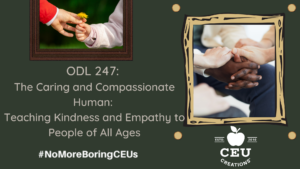
ODL 247: The Caring and Compassionate Human: Teaching Kindness and Empathy to People of All Ages
5 Credit Hours: Bullying has always been an issue in our society and that has not changed even in 2023. In fact some would say the prevalence of social media has made it more common. The latest statistics show that 73% of students say they have been bullied in their lifetime, and 44% say it has happened in the past 30 days. With 95% of teenagers connected to the internet and 85% of them on social media cyberbullying is a widespread societal issue. This course will focus on explicitly teaching kindness and empathy to children and adults of all ages.
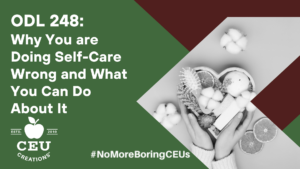
ODL 248: Why You are Doing Self-Care Wrong and What You Can Do About It
1 Credit Hour: Professionals in helping industries are known for giving to others at great personal cost. A study in 2005 showed a burnout rate of 39%. Unfortunately, the pandemic only added to this. A study in 2021 showed a burnout rate of 63.7%. One of the best ways to battle burnout is to practice self-care. Unfortunately, but understandably, many people adopted self-care routines that added to their burnout. During this event, participants will learn data on the current trends in burnout amongst helping professionals. Additionally, we will explore what self-care is not and examine how things such as watching Netflix and scrolling social media accentuate burnout and stress. Lastly, we will review what self-care is and discuss practices and habits to improve self-care. Participants will come away with actionable information to improve their self-care.
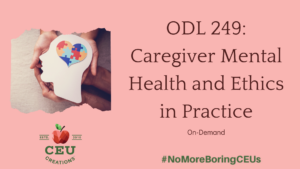
ODL 249: Caregiver Mental Health and Ethics in Practice
1 Credit Hour: This course aims to provide helping professionals with insight to the challenges that caregivers face daily and our ethical obligations in practice. The course will explore common challenges faced by caregivers, the impact of caregiver mental health on care recipients, boundaries, cultural competence, and advocacy. Strategies for promoting caregiver mental health and self-care will also be covered, emphasizing the importance of addressing caregiver needs to ensure quality care.

ODL 253: At the Bedside: When Death is Near
1 Credit Hour: Helping professionals are often called upon to help others through their grief and loss even when they are experiencing those same feelings. Feelings of grief and loss can be compounded when circumstances surrounding the loss are traumatic as well. In this course, Gabby Jimenez, creator of The Hospice Heart, shares practical tips and tools to help you to feel more comfortable and confident at the bedside of someone who is dying.
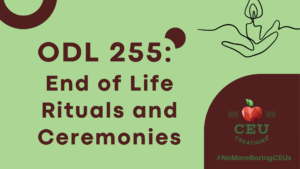
ODL 255: End of Life Rituals and Ceremonies
1 Credit Hour: In this one hour course Gabrielle Jimenez, LVN, CHPLN, Hospice Nurse, End of Life Doula, Author, Educator, and Founder of the Hospice Heart with over 150,000 followers, shares powerful rituals and ceremonies that can provide comfort to both those who are dying and those who are saying goodbye. Do not miss this unique course where Gabby speaks openly about all aspects of end-of-life to empower you as a professional to navigate these difficult conversations with your clients and their loved ones. Please note, it will be beneficial to have a candle and a lighting tool for the ritual presentation at the end of the course.
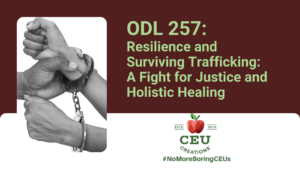
ODL 257: Resilience and Surviving Trafficking: A Fight for Justice and Holistic Healing
3 Credit Hours: Human trafficking is a crime of exploitation that harms the well-being of individuals and communities everywhere. There are an estimated 24.9 million victims worldwide at any given time. Sex trafficking is a worldwide epidemic, a tragedy that affects women, men, and children. This course dives into two survivor stories of human trafficking, holistic healing, and resources for professionals. This course shines a light on the survivors and unique ways of healing from such a horrific crime as human trafficking.
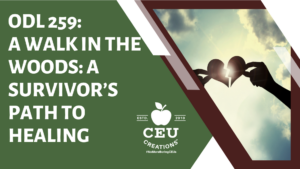
ODL 259: A Walk in the Woods: A Survivor’s Path to Healing
1 Credit Hour: Childhood trauma can cause long lasting effects that continue through adulthood. These effects can manifest in many different ways. In this powerful one hour interview with a survivor of childhood sexual abuse, we hear about the tools and resources used to walk through her healing process. Participants gain incredible insight and a phenomenal resource to use when working with their clients who have also experienced trauma.
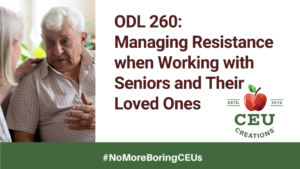
ODL 260: Managing Resistance when Working with Seniors and Their Loved Ones
1 Credit Hour: Working with seniors and their loved ones can be challenging yet rewarding work. Presented by Rebecca Abenante, MA, MSW, LSW ASW-G, Healthy Aging Coordinator and Geriatrics Fellowship Program Coordinator at Atlantic Health System, this course engages in a discussion around managing resistance when working with seniors and their care partners. Participants will leave with new insights, tools, and resources for your work with older adults and their loved ones.
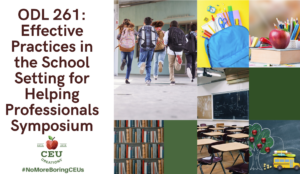
ODL 261: Effective Practices in the School Setting for Helping Professionals Symposium
4 Credit Hours: A child spends the second largest amount of time in school, right behind sleep. Therefore, it is imperative that schools are able to serve the whole child while they are there. This course will focus on how school social workers and other professionals can collaborate with school staff to make sure the whole child is being served. Innovative interventions will be discussed, and participants will leave with new ideas in the areas of improving attendance and implementation of restorative practices.
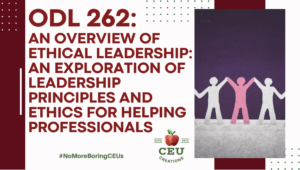
ODL 262: An Overview of Ethical Leadership: An Exploration of Leadership Principles and Ethics for Helping Professionals
1 Credit Hour: According to recent research, Ethical Leadership is “leadership demonstrating and promoting normatively appropriate conduct through personal actions and interpersonal relationships.” This definition embodies the ethical codes of social workers, counselors, nurses and case managers. In this dynamic training we will explore the traits and best practices of ethical leaders, servant leaders and practical ways to implement these in your daily jobs and lives.
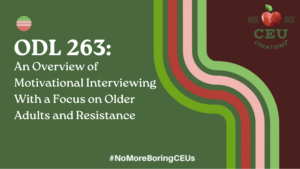
ODL 263: An Overview of Motivational Interviewing With a Focus on Older Adults and Resistance
1 Credit Hour: Motivational Interviewing is an ethical, effective technique for professionals in many practice settings to engage in meaningful conversations with clients to help facilitate attitude and behavior change. This workshop examines a brief definition and history, theoretical framework, style and spirit, process, and techniques of motivational interviewing. The workshop also explores how biases and diversity influences behavior and services, and provides tools for reflection, self-monitoring and regulation to manage personal values and maintain professional standards of practice. Participants will receive examples and tools for working with older adults and dealing with resistance.
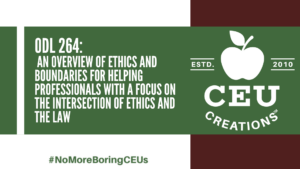
ODL 264: An Overview of Ethics and Boundaries for Helping Professionals with a Focus on the Intersection of Ethics and the Law
2 Credit Hours: Establishing and maintaining boundaries as a helping professional is essential, aiming to protect the client, the professional, and the professional’s employer. These boundaries help to avoid or reduce emotional distress and facilitate open, safe, and transparent communication that prioritizes the needs of the client while maintaining necessary boundaries for all. We will take a deeper look at the intersection of our ethics and laws through case scenarios and various activities.
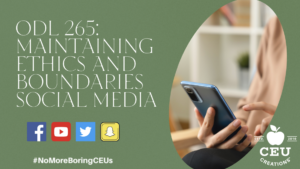
ODL 265: Maintaining Ethics and Boundaries for Helping Professionals with a Focus on Technology and Self-Care
2 Credit Hours: Establishing and maintaining boundaries as a helping professional is essential, aiming to protect the client, the professional, and the professional’s employer. This training will focus on boundary issues around social media, internet searches, and electronic record keeping. In addition, we will discuss the importance of ethics and boundaries in maintaining our own mental health as helpin professionals. This training will provide many tips and resources for helping professionals to take and utilize in the field right away!

ODL 268: Ethical Leadership Institute: An Exploration of Leadership Principles and Ethics for Helping Professionals to Improve Outcomes
5 Credit Hours: According to recent research, Ethical Leadership is “leadership demonstrating and promoting normatively appropriate conduct through personal actions and interpersonal relationships.” This definition embodies the ethical codes of social workers, counselors, nurses and case managers. In this dynamic training we will explore the traits and best practices of ethical leaders, servant leaders and practical ways to implement these in your daily jobs and lives. As we strive for excellence in our professions, this training will allow you to explore best practices in ethical leadership with the goal of ultimately improving outcomes for our clients.
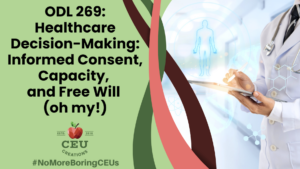
ODL 269: Healthcare Decision-Making: Informed Consent, Capacity, and Free Will (oh my!)
2 Credit Hours: Informed consent is a critical aspect of patient autonomy and respecting the dignity and worth of our patients. The consent process empowers patients to make informed decisions about their own care, treatment, and participation in medical research. This presentation will begin with a discussion of best practices and principles of informed consent and then move into a discussion of how to assess decision-making capacity. The speaker will also explore legal and ethical principles at play when discussing decision-making capacity, and how a clinician can move forward when a patient makes an “unwise” decision.
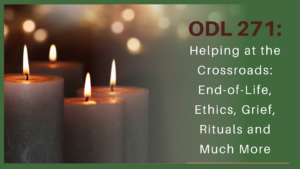
ODL 271: Helping at the Crossroads: End-of-Life, Ethics, Grief, Rituals and Much More
5 Credit Hours: Grief is a normal response of sorrow, heartache, and confusion after losing someone or something important to that person. Helping professionals are often called upon to help others through their grief and loss even when they are experiencing those same feelings. Feelings of grief and loss can be compounded when circumstances surrounding the loss are traumatic as well. In this course we will discuss the ethics of end of life care through a complex case scenario review, as well as discuss other tools professionals can use to deal with grief and loss in traumatic situations. To fully participate in this workshop, participants will need to have a candle, lighter, something to take notes with, and journal.
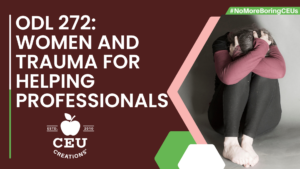
ODL 272: Women and Trauma for Helping Professionals
2 Credit Hours: This presentation will help individuals understand the variety of causes of trauma throughout a woman’s lifetime, and how trauma manifests in women throughout their lifetime and in different roles. Participants will leave the training with a better understanding of the “domino effect" of trauma in women and how it impacts generations, as well as how to best provide compassionate support and referral when appropriate and necessary.
